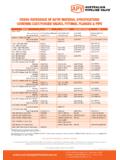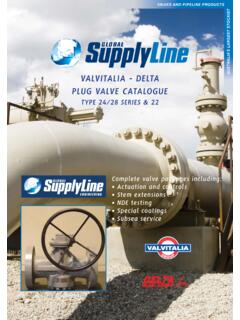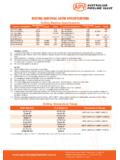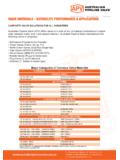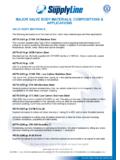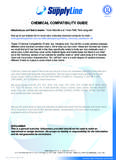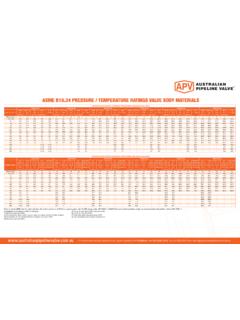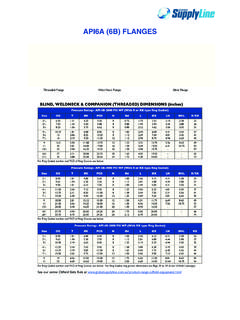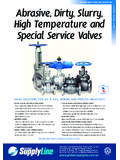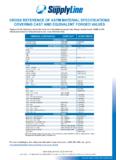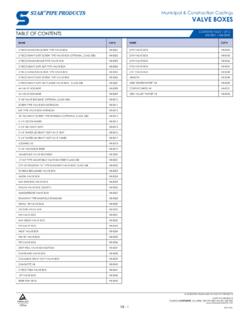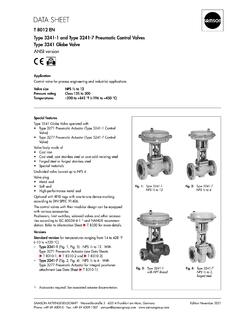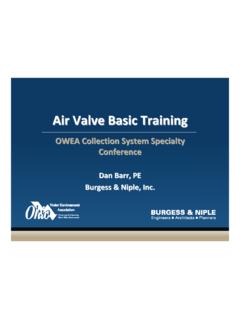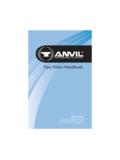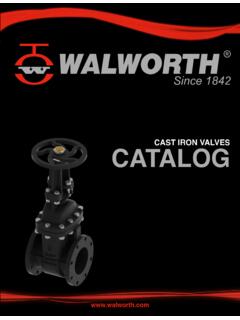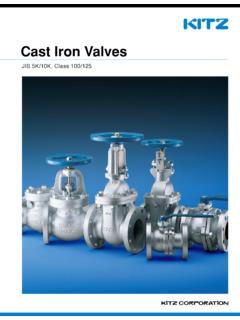Transcription of Leakage Acceptance Rates Comparison Metal & Soft …
1 ADELAIDE BRISBANE PERTH. Leakage Acceptance Rates Comparison Metal & soft . SEATED valves ISO 5208/API 598/API 6D/MSS SP-61/FCI 70-2. TESTING & Leakage Rates OVERVIEW. From an engineering point of view, almost all valves leak by some measure. valves may be said to be bubble tight' or zero Leakage ', but in actuality that is just a term that speci es the allowable Leakage of that classi cation. In the past many products were rated with Cold Working Pressure (CWP) ( 800 psi WOG which meant 800 psi working pressure for water, oil or gas service), instead of the ASME/ANSI pressure classes used today for most steel valves .
2 Of course many commodity', low pressure screwed end valves up to 2000 psi are still produced in CWP WOG. ratings. The base test speci cation for most steel valves is API 598 Valve Inspection & Test'. Most metallic seated valves larger than ANSI 50 NB (2 ) size have an allowable Leakage rate allowable in API 598. soft seated valves such as ball valves must be zero Leakage . Bronze gate, globe & check valves are usually only tested per MSS SP-61 Pressure Testing of Steel valves '. Pipeline valves ' such as trunnion mounted ball valves , pressure balanced lubricated plug valves and pipeline slab gate valves are tested to API6D - Pipeline valves '.
3 The testing requirements differ slightly from API 598. The primary difference being 6D's zero allowable Leakage on closure (seating) tests which is achieved as most of the valves built to API 6D are resilient seated. However, pipeline full port Metal seated API 6D check valves do have a seat Leakage allowance. API 598 does incorporate a zero Leakage requirement for soft seated valves used in re neries and downstream but API 6D is generally speci ed for pipeline valves . There are no API standards for globe valves or check valves (except full port API 6D style swing check valves ).
4 Hence valve manufacturers make globe valves to British standard BS 1873 Steel Globe and Check valves for The Petroleum, Petrochemical and Allied Industries'. BS 1868 is more commonly used for check valves . However, most manufacturers supplying cast steel ANSI anged or ANSI buttweld globe and check valves test them to API 598 and often specify wall thickness to API 600 or API 603 or dual conforming' to either/or: - ANSI , BS. 1868, BS 1873 or API 600. EXPLANATION OF ZERO AND LOW Leakage TEST STANDARDS. In general, speci cation such as API598 (mirrored by ISO 5208) or MSS SP-61 that govern Leakage for soft seated valves call for 0' bubbles of air or 0' drops of water under the speci ed test conditions over the minimum test time period.
5 These valves are therefore sometimes referred to as zero Leakage ' valves . In reality, there really is no such thing as zero Leakage ', since microscopic amounts of material may indeed cross the seat or packing boundaries, especially if helium or hydrogen or other small molecule gases are used. Another common term for soft seated valves is bubble tight'. Less frequently, the Leakage performance for soft seated valves is referred to as Class VI, which is the tightest Leakage under FCI 70-2, and generally applies to resilient seated control valves (as opposed to Metal seated control valves or soft seated shut off valves ).
6 In fact, FCI 70-2 Class VI (formerly ANSI ) allows a small number of bubbles per minute, increasing with valve size, during the test, whereas API598 and MSS SP-61 do not (for soft seat, but does for Metal seat). FCI 70-2 Class VI is for soft seated control valves but is frequently used as a Leakage Acceptance test criteria for Metal seated isolation valves such as ball and butter y valves . FCI 70-2 only requires a low pressure test, consequently closure and seat tests should also be done per API 598 or MSS SP-61. In actual fact even for Metal seat valves the API 598 leak Acceptance criteria for Metal seated valves (excluding check valves ) allows less Leakage than FCI 70-2 Class VI above 150NB (6 ) and 50NB (2 ) and under.
7 For zero Leakage Metal seated valves API 6D or API 598 soft seated zero Leakage criteria can be speci ed (such as triple offset Metal seated butter y valves and some Metal seated ball valves ). Special provisions for zero Leakage gate valves can also Global Supply Line Pty Ltd ABN 86 008 134 512. Head Office - 1 to 23 Barndioota Rd Salisbury Plain South Australia 5109 Ph +61 (0)8 8285 0000 Fax +61 (0)8 8285 0088 Page 1. V A LV E S A N D P I P E L I N E S U P P L I E S. be speci ed to BS 6755 (now EN 12266-1) and ISO 5208 under special zero Leakage classes.
8 However, Metal seated valves usually have some level of acceptable Leakage when tested, de ned rst as some acceptable amount of liquid, under test conditions and over the time period of the test. Knife gate valves refer to MSS-SP81 Leakage Rates for Metal seated (for resilient seat it's up to manufacturer and client to nominate Leakage ). ISO 5208 (EN 12266-1) supersedes BS6755-1 and speci es acceptable Leakage Rates such as Rate A' and Rate B'. Rate A allows no visible Leakage ', similar to API 598 for resilient seated valves . API 6D now references Leakage Rates in IS 5208 which in turn corresponds to Leakage Rates in EN 12266-1 (but only for class A, B, C, D, E, F & G).
9 COMMON VALVE TYPES & RELATED TEST STANDARDS. Valve type Common test standard Steel ball, gate, globe and check valves API 598/ ISO 5208. Steel ball, gate, globe and check valves BS 6755*, ISO 5208 (EN12266-1). cast Iron gate valves API 598/ ISO 5208, MSS SP-70. Bronze gate, globe and check valves MSS SP-80. Steel gate, globe and check valves larger than NPS 24 ASME Pressure seal gate, globe and check valves ASME Pipeline valves API 6D/ ISO 14313, ISO 5208. cast iron checks API 598/ ISO 5208, MSS SP-71. cast iron globes API 598/ ISO 5208, MSS SP-85.
10 cast iron plugs API 598/ ISO 5208, MSS SP-78. Steel ball valves API 598/ ISO 5208. Steel butter y valves API 598/ ISO 5208. Cryogenic valves API 598/ ISO 5208, BS 6364. Control valves FCI 70-2, ISA-S75. Pressure relief valves API 527, ASME PTC 25. * ISO 5208 (EN 12266-1) supersedes BS 6755. ANSI/FCI 70-2-1976 VALVE Leakage CLASSIFICATIONS. (supersedes ANSI ). There are six seat Leakage classi cations de ned by ANSI/FCI 70-2-1976 (supersedes ANSI ). The six valve Leakage classi cations are as follows: Class I. Identical to Class II, III, and IV in construction and design intent, but no actual shop test is made.
